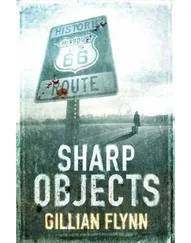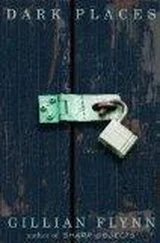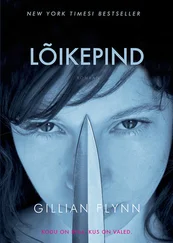“You should pick up every call, Nick,” Marybeth said.
“I recognized this one—just my college alum fund looking for money.”
Rand sat beside me on the couch. The ancient, much abused cushions sank severely under our weight, so we ended up pushed toward each other, arms touching, which was fine with Rand. He was one of those guys who’d pronounce I’m a hugger as he came at you, neglecting to ask if the feeling was mutual.
Marybeth returned to business: “We do think it’s possible an Amy obsessive took her.” She turned to me, as if pleading a case. “We’ve had ’em over the years.”
Amy had been fond of recollecting stories of men obsessed with her. She described the stalkers in hushed tones over glasses of wine at various periods during our marriage—men who were still out there, always thinking about her and wanting her. I suspected these stories were inflated: The men always came off as dangerous to a very precise degree—enough for me to worry about but not enough to require us to involve the police. In short, a play world where I could be Amy’s chest-puffed hero, defending her honor. Amy was too independent, too modern, to be able to admit the truth: She wanted to play damsel.
“Lately?”
“Not lately, no,” Marybeth said, chewing her lip. “But there was a very disturbed girl back in high school.”
“Disturbed how?”
“She was obsessed with Amy. Well, with Amazing Amy . Her name was Hilary Handy—she modeled herself after Amy’s best friend in the books, Suzy. At first it was cute, I guess. And then it was like that wasn’t good enough anymore—she wanted to be Amazing Amy, not Suzy the sidekick. So she began imitating our Amy. She dressed like Amy, she colored her hair blond, she’d linger outside our house in New York. One time I was walking down the street and she came running up to me, this strange girl, and she looped her arm through mine and said, ‘I’m going to be your daughter now. I’m going to kill Amy and be your new Amy. Because it doesn’t really matter to you, does it? As long as you have an Amy .’ Like our daughter was a piece of fiction she could rewrite.”
“We finally got a restraining order because she threw Amy down a flight of stairs at school,” Rand said. “Very disturbed girl. That kind of mentality doesn’t go away.”
“And then Desi,” Marybeth said.
“And Desi,” Rand said.
Even I knew about Desi. Amy had attended a Massachusetts boarding school called Wickshire Academy—I had seen the photos, Amy in lacrosse skirts and headbands, always with autumn colors in the background, as if the school were based not in a town but in a month. October. Desi Collings attended the boys’ boarding school that was paired with Wickshire. In Amy’s stories, he was a pale, Romantic figure, and their courtship had been of the boarding-school variety: chilly football games and overheated dances, lilac corsages and rides in a vintage Jaguar. Everything a little bit midcentury.
Amy dated Desi, quite seriously, for a year. But she began to find him alarming: He talked as if they were engaged, he knew the number and gender of their children. They were going to have four kids, all boys. Which sounded suspiciously like Desi’s own family, and when he brought his mother down to meet her, Amy grew queasy at the striking resemblance between herself and Mrs. Collings. The older woman had kissed her cheek coldly and murmured calmly in her ear, “Good luck.” Amy couldn’t tell if it was a warning or a threat.
After Amy cut it off with Desi, he still lingered around the Wickshire campus, a ghostly figure in dark blazers, leaning against wintry, leafless oak trees. Amy returned from a dance one February night to find him lying on her bed, naked, on top of the covers, groggy from a very marginal pill overdose. Desi left school shortly after.
But he still phoned her, even now, and several times a year sent her thick, padded envelopes that Amy tossed unopened after showing them to me. They were postmarked St. Louis. Forty minutes away. “It’s just a horrible, miserable coincidence,” she’d told me. Desi had the St. Louis family connections on his mother’s side. This much she knew but didn’t care to know more. I’d picked through the trash to retrieve one, read the letter, sticky with alfredo sauce, and it had been utterly banal: talk of tennis and travel and other things preppy. Spaniels. I tried to picture this slender dandy, a fellow in bow ties and tortoiseshell glasses, busting into our house and grabbing Amy with soft, manicured fingers. Tossing her in the trunk of his vintage roadster and taking her … antiquing in Vermont. Desi. Could anyone believe it was Desi?
“Desi lives not far away, actually,” I said. “St. Louis.”
“Now, see?” Rand said. “Why are the cops not all over this?”
“Someone needs to be,” I said. “I’ll go. After the search here tomorrow.”
“The police definitely seem to think it’s … close to home,” Marybeth said. She kept her eyes on me one beat too long, then shivered, as if shaking off a thought.
AMY ELLIOTT DUNNE
AUGUST 23, 2010
DIARY ENTRY
Summer. Birdies. Sunshine. I spent today shuffling around Prospect Park, my skin tender, my bones brittle. Misery-battling. It is an improvement, since I spent the previous three days in our house in the same crusty pajama set, marking time until five, when I could have a drink. Trying to make myself remember the suffering in Darfur. Put things into perspective. Which, I guess, is just further exploiting the people of Darfur.
So much has unraveled the past week. I think that’s what it is, that it’s all happened at once, so I have the emotional bends. Nick lost his job a month ago. The recession is supposed to be winding down, but no one seems to know that. So Nick lost his job. Second round of layoffs, just like he predicted—just a few weeks after the first round. Oops, we didn’t fire nearly enough people . Idiots.
At first I think Nick might be okay. He makes a massive list of things he’s always meant to do. Some of it’s tiny stuff: He changes watch batteries and resets clocks, he replaces a pipe beneath our sink and repaints all the rooms we painted before and didn’t like. Basically, he does a lot of things over. It’s nice to take some actual do-overs, when you get so few in life. And then he starts on bigger stuff: He reads War and Peace . He flirts with taking Arabic lessons. He spends a lot of time trying to guess what skills will be marketable over the next few decades. It breaks my heart, but I pretend it doesn’t for his sake.
I keep asking him: “Are you sure you’re okay?”
At first I try it seriously, over coffee, eye contact, my hand on his. Then I try it breezily, lightly, in passing. Then I try it tenderly, in bed, stroking his hair.
He has the same answer always: “I’m fine. I don’t really want to talk about it.”
I wrote a quiz that was perfect for the times: “How Are You Handling Your Layoff?”
a) I sit in my pajamas and eat a lot of ice cream—sulking is therapeutic!
b) I write nasty things about my old boss online, everywhere—venting feels great!
c) Until a new job comes along, I try to find useful things to do with my newfound time, like learning a marketable language or finally reading War and Peace .
It was a compliment to Nick—C was the correct answer—but he just gave a sour smile when I showed it to him.
A few weeks in, the bustling stopped, the usefulness stopped, as if he woke up one morning under a decrepit, dusty sign that read, Why Fucking Bother? He went dull-eyed. Now he watches TV, surfs porn, watches porn on TV. He eats a lot of delivery food, the Styrofoam shells propped up near the overflowing trash can. He doesn’t talk to me, he behaves as if the act of talking physically pains him and I am a vicious woman to ask it of him.
Читать дальше












